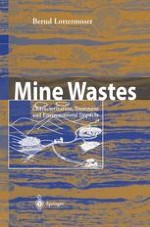2003 | OriginalPaper | Buchkapitel
Tailings
verfasst von : Dr. Bernd Lottermoser
Erschienen in: Mine Wastes
Verlag: Springer Berlin Heidelberg
Enthalten in: Professional Book Archive
Aktivieren Sie unsere intelligente Suche, um passende Fachinhalte oder Patente zu finden.
Wählen Sie Textabschnitte aus um mit Künstlicher Intelligenz passenden Patente zu finden. powered by
Markieren Sie Textabschnitte, um KI-gestützt weitere passende Inhalte zu finden. powered by
Mineral processing of hard rock metal ores (e.g. Au, Cu, Pb, Zn, U) and industrial mineral deposits (e.g. phosphate, bauxite) involves size reduction and separation of the individual minerals. In the first stage of mineral processing, blocks of hard rock ore up to a meter across are reduced to only a few millimeters or even microns in diameter. This is achieved by first crushing and then grinding and milling the ore (Fig. 1.2). Crushing is a dry process; grinding involves the abrasion of the particles that are generally suspended in water. The aim of the size reduction is to break down the ore so that the ore minerals are liberated from gangue phases. In the second stage of mineral processing, the ore minerals are separated from the gangue minerals. This stage may include several methods which use the different gravimetric, magnetic, electrical or surface properties of ore and gangue phases (Fig. 1.2). Coal differs from hard rock ore and industrial mineral deposits as it does not pass through a mill. Instead, the coal is washed, and coal washeries produce fine-grained slurries that are discarded as wastes in suitable repositories. Consequently, the end products of ore or industrial mineral processing and coal washing are the same: (a) a concentrate of the sought-after commodity; and (b) a quantity of residue wastes known as “tailings”. Tailings typically are produced in the form of a particulate suspension, that is, a fine-grained sediment-water slurry. The tailings dominantly consist of the ground-up gangue from which most of the valuable mineral(s) or coal has been removed.
